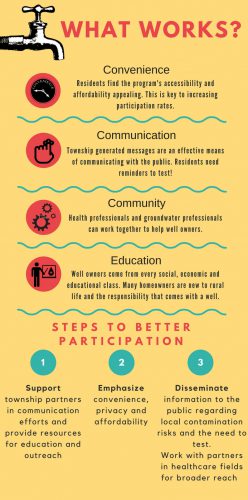Arsenic: What is it and where does it come from?
Click on the image above to access the complete informational circular “Arsenic in NJ Groundwater” published by the NJ Geological Survey.
NJ Arsenic Awareness Website (tinyurl.com/arsenichelp) – includes NJ-based testing companies, treatment companies, and FAQs on treatment, testing and health risks. The home of awareness, testing and treatment videos. The site is produced by the Columbia Superfund Research Program in collaboration with NJDEP.
A Homeowner’s Guide to Arsenic in Drinking Water- NJDEP
Arsenic and You: https://www.dartmouth.edu/~arsenicandyou/index.html – Information on Arsenic in Food, Water & Other Sources. Produced by the Dartmouth Toxic Metals Superfund Research Program
 Private Well Testing Act data on where arsenic is found in private drinking water supplies throughout the watershed.
Private Well Testing Act data on where arsenic is found in private drinking water supplies throughout the watershed.
Private Well Testing Act Data Summary and Interactive Map: (http://www.nj.gov/dep/dsr/pwta/) “The New Jersey Private Well Testing Act (N.J.S.A. 58:12A-26 et seq.) became effective in September 2002. The PWTA requires the buyer or the seller of a property to test the untreated well water prior to the sale and review the results prior the closing of title. It also requires landlords to test the private well water supplied to their tenants every five years and provide their tenants with a written copy of the results. The data from the PWTA are used by NJDEP to assess the quality of the water from private wells throughout the state. The Act allows the release of PWTA information as a compilation of test results by county and municipality or other appropriate geographic areas. The names of specific property owners, their addresses or locations are not included.”
Health effects of arsenic exposure (http://njarsenic.superfund.ciesin.columbia.edu/health?categ=12) “Chronic exposure to the low doses of arsenic found in well water causes a range of serious health problems in adults, including skin lesions, skin, lung, liver and bladder cancer, hypertension, ischemic heart disease, diabetes mellitus, non-malignant respiratory disease, and cognitive and motor function deficits in children. In acute doses, arsenic is lethal on the time frame of a few hours.” Learn more about the risks of arsenic exposure by visiting this link.
In Small Doses: Arsenic is a ten minute movie about the risks associated with exposure to potentially harmful amounts of arsenic in private well water.
Problemas con el agua potable: Arsénico
 Testing your well water for arsenic:
Testing your well water for arsenic:
Raritan Headwaters Community Well Testing Program: RHA partners with municipalities throughout the region to offer residents the opportunity to test their well water. Towns decide when to offer the testing, the test dates are advertised and RHA provides testing kits to town hall. On a designated day, residents bring their water samples to the municipal building where volunteers sort and then deliver the samples to the RHA office, where they are picked up by a state-certified laboratory for analysis. Test results come directly to us, and we share the results directly with residents. This program makes the important practice of regular well testing even easier and more convenient for residents.
NJ labs with strong arsenic testing capabilities: http://njarsenic.superfund.ciesin.columbia.edu/testing
Video: Testing your well water
 Treatment options for homeowners :
Treatment options for homeowners :
Fact Sheet: Arsenic Treatment
Video: Arsenic in Well Water-Treatment Options
FAQs on testing and treatment for arsenic
Active Treatment Firms in Hunterdon County, NJ
![]() Local ordinances for arsenic testing and treatment:
Local ordinances for arsenic testing and treatment:
ORDINANCE NO. 16-17 TOWNSHIP OF HOPEWELL, MERCER COUNTY, NEW JERSEY
TESTING AND REPORTING REQUIREMENTS FOR WELLS AND SEPTIC SYSTEMS PRIOR TO TRANSFER OF PROPERTY.
 Tools for local leaders to better inform residents about well water contaminants and the importance of testing and treatment:
Tools for local leaders to better inform residents about well water contaminants and the importance of testing and treatment:
Community Well Testing Program brochure- find out more about RHA’s long-standing program that helps private well owners test for arsenic, bacteria, nitrates and other contaminants that may be found in well water.
Well Water Community Action Toolkit: This toolkit was created for the NH Department of Environmental Services (NH DES) and NH Department of Health and Human Services (NH DHHS), as part of a two year US Centers For
Disease Control and Prevention (CDC) grant, titled “Assessing and Managing Risks Associated
with Exposure from Arsenic in Private Wells”. It was designed to share lessons learned, with a specific focus on actions that work within local communities to increase community knowledge of private well water contaminants, and to increase well water testing and treatment.
Watershed-wide Well Testing Report Card 2017-2018: Data from the Raritan Headwaters Community Well Testing Program
Arsenic flyer that may be posted to community bulletin boards
What’s in your well water? an arsenic awareness video for adults
OPERATION: CLEAN WATER an arsenic awareness video for schoolchildren
Community Well Test Participant Pilot Study FAll 2017
Presentations:
Watershed Tools for Local Leaders Seminar Series: Informing Residents of the Health Effects of Arsenic in Drinking Water & the Need to Test and Treat Private Wells – September 14, 2017 (presentations available upon request)
Health Effects of Arsenic Exposure– Joe Graziano, PhD, Professor Environmental Health Sciences, Mailman School of Public Health, Columbia University
New Jersey’s Private Well Testing Act:
Geographic Summary and Recent Community Intervention Activities– Nicholas A. Procopio, PhD, Bureau of Environmental Assessment, Division of Science, Research, and Environmental Health, NJ Dept. of Environmental Protection (NJDEP)
Arsenic Water Treatment Options for Private Well Owners – Steven Spayd, PhD, Research Scientist and Hydrogeologist, Bureau of Water Resources and Geoscience, NJDEP – New Jersey Geological and Water Survey
Hopewell Township Ordinance for Arsenic Treatment Reduces Cancer Risk – Megan Rockafellow-Baldoni, PhD, MPH, Rutgers University School of Public Health: Dept. Environmental & Occupational Health,
New Jersey Department of Environmental Protection: NJ Geological and Water Survey
How to Assist Well Owners– Debra Vaccarella- Hunterdon County Division of Public Health Services
Raritan Headwaters Community Well Testing Program – Mara Tippett, Raritan Headwaters Well Testing Program
image credit: USGS National Geologic Mapping Program; GMS 18-2, Geologic Map of the New Jersey Portion of the Lumberville Quadrangle, Hunterdon County, New Jersey



